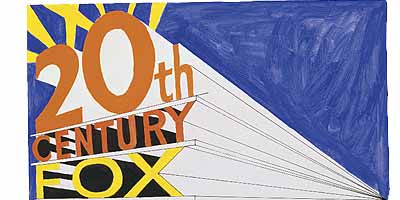
Certain artists become a place. Canaletto is Venice. Constable is the English countryside. Homer is New England, and Hopper is Depression-era New York. Ed Ruscha is that kind of artist: He’s Los Angeles. He doesn’t record every aspect of L.A., of course, any more than Constable documents every detail of rural England. You don’t find movie stars or an homage to the Pacific coastline in his work. And yet Ruscha, more than any of his contemporaries, captures the peculiar presence of the city. Whenever I come upon a Ruscha, I am suddenly there, palpably there, as if I were about to turn on the radio, ease into the traffic on Santa Monica, and let the world float across my brain pan.
This startling effect does not depend upon a rendition of the city’s appearance. Ruscha is best known for depicting certain L.A. symbols, such as the Standard gas station and the celebrated hollywood sign, but his more abstract images of words and phrases create the same, mysterious sensation of the city. The current pair of Ruscha exhibits at the Whitney Museum of American Art (Cotton Puffs, Q-Tips, Smoke and Mirrors: The Drawings of Ed Ruscha is a show of about 200 drawings organized by Margit Rowell, and Ed Ruscha and Photography is a collection of photographs and books of photographs organized by Sylvia Wolf) suggests some of the reasons his art developed this aura. Ruscha’s drawings and photographs may be more quirkily personal than his paintings, but they have the same distinctive L.A. mood. If you like L.A., you’ll probably like his art. If you don’t, you’ll find it tiresome and repetitive.
His drawings often isolate an object, form, or phrase—fragments of human order and meaning—within a seemingly infinite nothingness. The razor-clean gas station has the proud formal presence of a temple, for example, but it stands in a void that’s neither spiritual and enlarging nor demoralizing and dark. The space has no particular inflection. It reflects no opinion or point of view. It just is. Its character gives the isolated forms on view a somewhat disconnected and absurdist air, as if they had been removed from their usual contexts and placed in a specimen jar. Ruscha does something similar in his marvelously deadpan photographs, which are usually displayed as part of a series in a book. (Among the subjects are gas stations, palm trees, swimming pools, for sale signs, parking lots.) The photographs are usually very small, but they, too, suggest a vast space, much as looking through the wrong end of a telescope makes objects look tiny in a big way. His series of for sale signs has an air of endlessness. It could go on and on. Each sign is different, but they are all the same. Nowhere is everywhere.
“Canaletto is Venice; Homer, New England; Hopper, Depression-era New York. Edward Ruscha is L.A.”
Ruscha likes to drop phrases into a pool of space, where the meanings dissolve and ripple outward, creating in viewers a kind of surreal reverie. In some drawings, the words resemble delicate ribbons of folded paper that could at any moment break apart—come undone into a conundrum. If the brusque word quit appears girlishly scripted, for example, does the meaning quit its form? A rakish little dancing pencil that Ruscha puts in this drawing could certainly lead the girlish astray.
Not surprisingly, Ruscha’s pictures of words are often likened to Pop signs or billboards. The analogy is apt, but only if you recognize that such signs are not, in any important sense, still—because, after all, you are moving. Signs are glimpsed in passing, and they can develop an afterlife. In one drawing, Ruscha put the word paradise in lights, as if it were a casino or a strip club. But the word, as he depicts it, does not stop there. His paradise glitters, diagonally, in deep space. Depending upon your point of view, the letters appear to get bigger or smaller. You can’t tell, in other words, whether paradise is approaching or receding. I feel the same way in L.A.